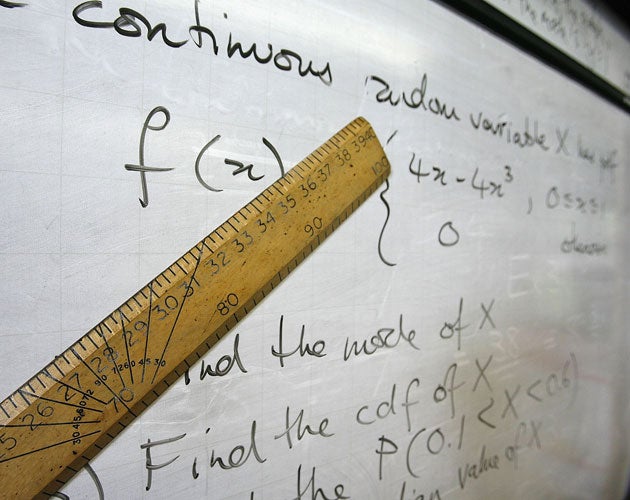
What courses? Mathematics; applied mathematics; computer game technology; computing; business and mathematics; theoretical physics; statistics; financial mathematics; computer science; mathematical biology; natural sciences.
What do you come out with? BSc, MMath, MSci, BA or MA in Scotland.
Why do it? "Mathematics is a stimulating and rewarding degree choice, and mathematics graduates are highly sought after for their analytical skills and problem-solving abilities. You could be asked how to ensure credit card details are secure, how to design clinical trials to make sure a new drug is safe, how to model global warming, or even how to get a rocket to Mars. So, if you want a degree that will challenge you and push you to the limits of your potential, choose mathematics." - Dr Charles Fall, head of mathematics and statistics at Northumbria University
What's it about? Statistics, calculus, algebraic equations, implication, differential equations and many more extremely complicated sounding words. At degree level mathematics is a mix of pure (theory) and applied (how maths relates to the rest of the world) mathematics. Some institutions even offer these as separate degrees. Generally you'll have to grapple with algebra, analysis, calculus, probability, statistics, logical reasoning, matrices and complex numbers. You can do joint honours maths degrees, with anything from art history to computer science or religious studies. There are over 1,000 maths and maths related degree courses available for 2012 so working out the right one for you on a probability basis could pose a fun challenge. Assessments vary from examinations and practical coursework such as computing and statistics.
Study options: The course lasts three years, or four in Scotland. Four at Keele if you combine it with a language and spend a year abroad. Four at Warwick if you opt for the maths degree. Three (BSc) or four (MMath) at Manchester, York and most institutions. Straight from the beginning, Cambridge gives you the chance to choose between a pure and applied mathematics and a mathematics and physics course.
What will I need to do it? Most of the courses requires a A-level at grade A in Maths. Other scientific and related subjects help. The average A-level range is AAA – ABB, while many institutions will interview all the UK-based applicants.
What are my jobs prospects? Prospects for maths students are very good. All the big corporate names like PricewaterhouseCoopers and KMPG will be at your uni’s recruitment fairs. And if you’d rather not become an accountant, an actuary or a banker there are plenty of other options (like computing) for your logical brain to suss out. A lot of students go onto teach maths – a trend tutors predict will rise in the near future amid recessionary times and a bad press for the City. According to The Times’ Good University Guide 2012, around one third of students go straight into graduate-level jobs, and over 40 per cent go on to further study. Graduate salaries are just above average, at £23,160.
Where’s best to do it? According to the Complete University Guide 2012, Cambridge, Oxford and the Imperial College are the top three. Students at Stirling, Greenwich and Northumbria were the most satisfied.
Related degrees: Physics; business and management; computer science; accounting & finance; economics; engineering.
Subscribe to Independent Premium to bookmark this article
Want to bookmark your favourite articles and stories to read or reference later? Start your Independent Premium subscription today.

Join our commenting forum
Join thought-provoking conversations, follow other Independent readers and see their replies